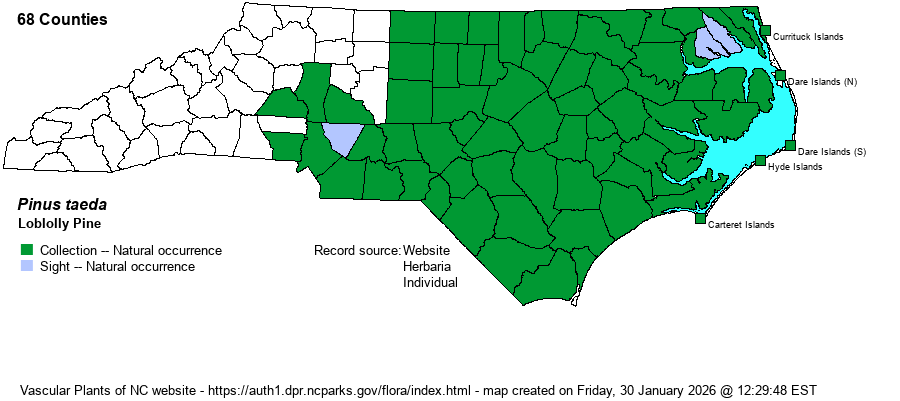| Author | L. | |
| Distribution | Throughout the entire Coastal Plain and eastern half of the Piedmont. It is common on the Outer Banks, but may be scarce to absent on a few islands. The western edge of the natural range is quite abrupt, stopping at Rockingham, Catawba, and Gaston counties. Owing to extensive pine plantations in the same region, there are many scattered records farther west in the Piedmont. In fact, the species might not be truly natural in some of the central Piedmont counties. Any Mountain records would be of escaped individuals. The original range was apparently limited to lowlands of the Coastal Plain, but it has naturally spread with fire suppression to uplands there and to both wetlands and lowlands farther west. The website editors have decided not to map non-natural or possible non-natural occurrences -- a much too troublesome task!
A Southern species, found from southern NJ south to central FL and east-central TX. It avoids the mountains, but it ranges north to at least southern TN. | |
| Abundance | This may be the most numerous tree in the state, even discounting the millions of individuals in pine plantations. It is abundant across all of the Coastal Plain and the eastern 40% of the Piedmont; less numerous in the central Piedmont. It simply is impossible to miss on any outing in the eastern 60% of the state. | |
| Habitat | Though historically believed to be mainly a tree of non-peaty bottomlands and other low ground in the Coastal Plain, it has spread naturally to a variety of other wetlands and especially to mesic or rather dry soil in disturbed uplands. It commonly invades old fields, and unfortunately it invades Longleaf Pine (P. palustris) stands that have been fire suppressed. As with most of our pines, it is a successional species, and thus the pines die out over several decades as hardwoods increase over time. One exception is that Loblolly Pine is a natural “climax” species along the forested margins of some brackish marshes and in maritime forests, especially around the margins of Pamlico Sound. |
| Phenology | Pollen is shed in March and April, and mature cones set seed in October and November. | |
| Identification | Though this species is seen many times a day by most people, it still can be confused with a few other pines in NC. The species is a large evergreen tree, often at times over 100 feet tall and 3 feet or more in trunk diameter. The needles are gray-green to yellow-green (but not bright green) and about 7 inches long, in fascicles of 3. The cones are fairly long, averaging about 4 inches, and much narrower. The narrow cones, when unopened, should quickly separate it from Pond Pine (P. serotina), if cones are visible; the latter tree has round cones. If cones are not visible, Loblolly has a straighter trunk, straighter limbs, needles not growing out the trunk, and a generally more stately look; the needles tend to be slimmer than on a Pond Pine, but separating the two might still be tricky for inexperienced observers. Slash Pine (P. elliottii), not native in NC but present in some plantations, has somewhat longer needles that are a brighter and shinier green, and has cones that are shiny reddish-brown. Even so, from time to time even experienced observers can be confused at the identity of these three, at least when cones are not present on the trees or on the ground. | |
| Taxonomic Comments | None
| |
| Other Common Name(s) | None really, though Old-field Pine, Southern Pine, and perhaps one or two others have been used in the past. | |
| State Rank | S5 | |
| Global Rank | G5 | |
| State Status | | |
| US Status | | |
| USACE-agcp | FAC link |
| USACE-emp | FAC link |

